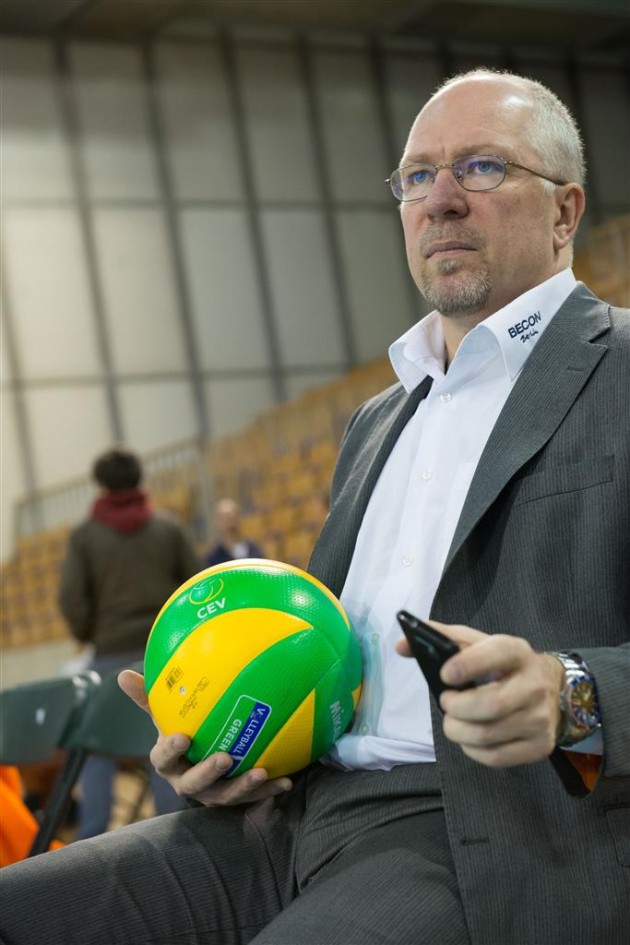
Mark Lebedew
The most memorable thing about this match was the spike warm up, which included an unofficial bouncing competition between Dutch players Bas van de Goer and Guido Gortzen and Yugoslavian legend Vladimir Grbic. It concluded after the referee had blown his whistle and most players had already left the court. Grbic hit one more ball, bouncing it very high, while dragging the net down with his elbow and walking off the court with arms raised.
The match was between the medallists from the previous year’s Olympics, The Netherlands and Yugoslavia. The Dutch had already started rolling over their lineup and starting two new players, Nummerdor and Schuil. Yugoslavia was unchanged.
Some thoughts about the match…
Why didn’t anyone serve at the middles? Yugoslavia hit the middles a few times in the second set (which they won) but mainly aimed at one of the receivers. Otherwise the middles only received more or less by accident. This was really strange, unless they are much better receivers than we remember. A year later at the World Championships there were liberos for the first time. A couple of teams refused to use a libero, arguing that the middles hated it and it affected their focus and concentration. There were discussions among technical experts at the event that that decision cost Yugoslavia the World Championships. So maybe they weren’t good receivers and Netherlands would have won if they had served more to them. Oh, wait…
There aren’t many pipes. Yugoslavia manage about four for the match, three in the fourth set. Netherlands only with van de Goer. Which is incidentally another reason Yugoslavia should have served more to the middles. They did for a period in the second set, but that was all. They won the second set. And lost the other three.
People who remember this as an era with a lot of attack combinations are remembering it wrong, at least from these teams. Yugoslavia consistently ran combinations with their setter in position 1 and halfheartedly in a couple of other rotations, and the Dutch most definitely did not. And when there were combinations, there was no switch blocking. I suspect this not a coincidence.
The video is pretty grainy and not good quality after the second set, but you can still see Blange using a lot variation of body and head movements to free up his hitters. The ball back to Schuil is a joy to watch. He uses it with a long quick (B, 31, 7) and the quick behind (A, 2, 71?). It is worth noting though that the rhythm and tempo are beautiful but the precision less. Schuil has more or less only a step close approach and can easily adjust in a big range.
Nikola Grbic sets a lot more first tempo than he did later in his career, and dare I say, was known for. All through the match he not only sets first tempo, but also forced it from different positions.
The most underrated rule change in history is stopping the service attempt rule that means servers have only one toss. Yugoslavia used it as a deliberate tactic (or they were terrible at jump serving). Can something be tedious AND annoying? It was certainly ineffective.
I always liked Vujevic more than Vladi Grbic.
Guido Gortzen was extremely dynamic!
The second set get pretty fiery. Even Vujevic got a yellow card! One of several. With a few cards and Yugoslavia managing to serve to the middles. At least one of those things helped them win the set. Actually probably both.
Yugoslavia were probably on the wrong end of a couple of 50/50 referees calls in the third set. And it must have been getting pretty chippy because the referee spoke to both captains before the start of the fourth.
In the fourth set, Yugoslavia miss too many easy sideout opportunities, 1 v 1s and so on. At one stage three in a row, at another two in a row. They won a couple of cheap points at the end but they were well beaten. It would require the emergence of Geric and Miljkovic before they could make the final jump up the podium.
About Mark Lebedew:
Mark Lebedew authors the At Home on the Court Blog. He coaches professionally in Poland, in season 2019/20 with Aluron Virtu CMC Warta Zawiercie. That follows five seasons Germany where his Berlin Recycling Volleys won three straight league titles and a CEV Champions League bronze medal. He has prior professional experience in Belgium and Italy. Mark was also Head Coach for the Australian Men’s National Team.
Mark partnered with his brother and father to translate and publish “My Profession: The Game“, the last book by legendary Russian coach, Vyacheslav Platonov.
With John Forman, he is behind the Volleyball Coaching Wizards project (link http://volleyballcoachingwizards.com/) which identifies great coaches from all levels, making their experience, insights, and expertise available to people all over the world. The project has produced multiple books, a in e-book format available here ( link to http://bit.ly/34yakou ) or in print at Amazon here (link https://amzn.to/2JRqTE6)
————————————————————————————————–
Since you are here…
…we have a small favor to ask. WorldofVolley is one of the most popular volleyball websites in the world that provides many volleyball news daily. We are covering many worldwide competitions, trying to inform all of our fans by publishing the breaking news.
Since we want to keep our future much secure, consider this donate button as a way to support our work and to help us grow.
THANK YOU!